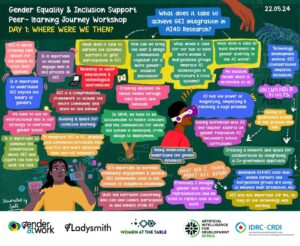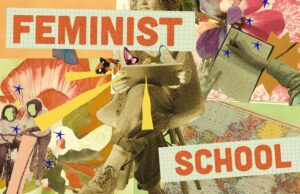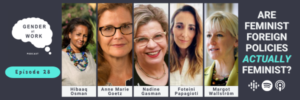As a part of my undergraduate degree in International Development and Globalization, gender studies has played an important role in terms of contributing to the programs’ foundation. The various courses offered, both required and optional, explored the intersectional nature of gender and how it affects every aspect of women, men, and transgendered people’s daily lives. While women’s roles specifically and their representations has changed over time, the systemic nature of gender inequality and discrimination (of LGTBI groups as well) continues to be reproduced throughout the world’s societies. After pursuing some work in Canada on gender activism, I sought to deepen my understanding of gender dynamics and how they might exist in different contexts. Through the University of Ottawa I came across an opportunity for a three month internship with Gender at Work in South Africa and it seemed like the perfect opportunity to not only deepen my understanding of gender and gender equality programs but to practically complement my overall field of study.
Reflecting on My Internship
It has been just over two and half months since I arrived in South Africa and the work I have been doing with my host organization – Gender at Work – has been a rollercoaster. The first two weeks of the internship proved to be laid back where my days consisted of reading previous G@W documents, important feminist writings, and making links as well as drawing conclusions – very similar to school. I’ve also been doing typical intern tasks such as filling out funding applications (actually quite useful), cutting and gluing posters to prep for meetings, and taking detailed meeting minutes and documentation. However, the pace picked up quite a bit when the organization flew the other intern and myself to Johannesburg where G@W was facilitating one of their programs called Letsema. The organization had us stay in the Vaal – which is an area about an hour outside of Joburg that provided a more realistic perspective of what life is like for many in South Africa. We stayed with a beautiful family who were warm and hospitable towards us, treating us as one of their own. Workdays were very long, with 4 am wake-ups, and return home at about 4:30-5 pm. Despite the long hours, the work has been phenomenal.
Letsema, which is a Sotto word for women and men coming together to work the soil, is a fairly new program but they have done a tremendous amount of work since their debut, just over 2 years ago. The program is composed of different sub groups such as drug and alcohol abuse, vegetable garden, dialogue group, core group, sports, and men’s calabash. Every group does different work but they all share the overall goal of achieving 0% gender based violence in the Vaal.
Every morning the session began with tai chi followed by an introductory check-in where people would express where they were at, how they were feeling, what they have learned, and potential questions or concerns they have. The rest of the day consisted of different activities that allowed each group to reflect on what they had been doing in their communities over the past few months as a part of Letsema, and what had been working, not working etc. For example, one of the activities required each group – represented by different coloured stickers, – to place their stickers on different categories. There were five categories, each representing the individual, family, neighbourhood, community and the broader social context. They were asked to relate their program and personal experiences to these different categories; and how they exercised influence over them; and how these categories/actors influence Letsema groups. The activity generated a deep reflective discussion that really impressed me. The participants were able to make connections with themselves and the different stakeholders around them, understanding and explaining their roles as individuals and as members of Letsema, while being mindful of the future steps they needed to take to address GBV in the Vaal. What also impressed me was the level of comfort people felt in discussing their issues about being victims of domestic violence, rape, discrimination, etc.
I think a reason for this level of comfort is a result of the “Open Space” that Letsema has provided for these people. Just like the name “Open Space” suggests, it is an open space in both physical and conversational terms. It is a process that requires participants to make sure they raise topics they feel passionate about and participants are also required to take responsibility for their own participation. The whole process is centred on conversation, engagement, diversity and reflection. The open space allows for anything and everything to be spoken about. It was so interesting to see how a big empty room with some chairs, pens and cardboard could generate such deep conversations and powerful questions. Every single participant that I interviewed during my time there mentioned and emphasized the power of the open space and how it allowed them to feel empowered in sharing their stories with others. In other words, this safe, judgment-free environment allows participants who often feel they have no voice, to build confidence and encourages them to learn from one another.
This program allows its participants to take ownership over their advocacy and work in the communities and I think that’s why it’s been so successful and will be sustainable in the long run. These people are so passionate and truly committed to their cause of achieving 0% GBV that they embody this cause in their every action. They own this cause and are role models in their community. Their energy is extremely addictive and is reflected through the constant influx of new members. People are beginning to understand how to challenge traditional gender norms that often lead to GBV and how to facilitate change in their communities for the future.
Photo: Letsema: Oxfam International, Breaking the silence on Gender-based violence
In the end, all this seemed quite ironic because if something so simple like an open space can generate such growth in individuals, why is it not more widely used in other gender related development work? Furthermore, this program is not resource rich by any means but the simple opportunity to speak and share with members of ones community has proven to be a powerful tool. Much of my work since Johannesburg has reflected drawn from my experiences at this workshop where I have provided documentation and recordings of the event for external evaluators. This documentation is very important because it serves, as evidence to funders that what Gender at Work is doing in South Africa is useful.
The Gender at Work unit in South Africa works in tandem with the Labour Research Services (LRS), a non-profit labour service organisation. The LRS specialises in research, dialogue-building, and developmental projects with the broad aim of strengthening civil society and a particular focus on the world of the work. Their aim is to work towards an egalitarian society, which treats all people with dignity and respect. All shall have equal access to the political, legislative and economic resources and activities of society. Basically LRS and Gender at Work came together when the LRS adopted a gender mainstreaming approach several years back and have continued working together since. As a part of the internship, I have been working on a case study to analyze how the LRS has changed as an organization, since the merger, in terms of the work they do and their organizational relationships.
Overall, I would say the most valuable lesson I will be taking home from this internship is what I have learned about Non-Governmental Organizations (NGO) and their general function as an organism. As an international development student, we constantly talk about NGOs and their role on the international field in terms of practical work in all dimensions of development. I have found it extremely interesting to see how an organization functions without a hierarchal structure. Everyone is a leader and power relations within the work place are understood in terms of power-to or power with instead of power-over. This approach ensures that everyone has a sense of ownership over their work because they are just as accountable as their neighbour for the work that they do. This transcends into the actual programs they create and facilitate, where a collective approach has proven successful. This approach in turn creates more sustainable work and approaches towards their cause as an organization.
by KAITLYN POSSELWHITE









